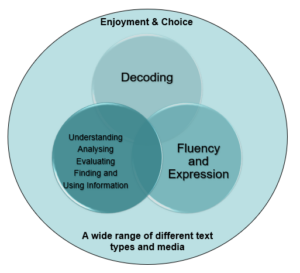Within a curriculum that promotes enjoyment and choice through exploring a wide range of different types of text and media, learners will have opportunities to develop effective skills for reading.
Across each year, learners will engage with texts written for the three main purposes: to persuade, to inform, and to entertain. Through varied reading experiences, learners will increasingly develop their skills including decoding, fluency, expression, comprehension, analysis and evaluation. They should develop increasing levels of enjoyment, confidence and interest when exploring and engaging with different styles of text, as well as the tools which support their reading competence.
The integration of the Reading CfE organisers within a responsive and inclusive curriculum helps learners develop an effective range of skills. Through thoughtful planning and timely, targeted support, practitioners can create the conditions for reading to be a meaningful, enjoyable, and successful experience for all.
Assessment and Analysis
The Reading Assessment Resource Pack has been developed to support practitioners in planning, delivering, and moderating high-quality learning, teaching and assessment of reading. It offers a range of practical tools and guidance to promote a balanced and progressive approach to reading across all levels.
Core Resources
These materials are intended to be used flexibly but provide greater consistency across all schools and settings in Fife.
Contextualised Curriculum
As reading skills are central to many aspects of learning, a well-established reading culture will encourage and support engagement with text for different purposes across a variety of contexts. Through daily routines, activities, and experiences across the curriculum, practitioners will harness opportunities for learners to engage with texts whether following their own learner-initiated or teacher-directed purposes.
Practitioners will provide authentic, meaningful contexts for reading, linking academic learning to relevant aspects of life and the broader world. Supporting learners to see the purpose for developing effective reading skills is central to building motivation and confidence and help them value these skills for learning and life.
Responsive Routes
Reading is not a natural skill and there are many elements which must combine to support effective engagement with text. To ensure learners experience success, practitioners will use their knowledge and understanding of reading development to plan instruction and create the conditions that builds essential knowledge, skills and understanding throughout each stage, responsive to the needs of learners.
Inspiring Input
A strong reading culture across classrooms and the wider school community plays a vital role in nurturing a lifelong love of reading. Practitioners will act as reading role models, reading texts aloud and harnessing literature to support learners’ cognitive, emotional, and social development. Carefully considered, inviting reading spaces should promote independent exploration of texts that spark curiosity or deepen knowledge.
Class and school libraries should offer diverse, inclusive texts that reflect both classic and contemporary voices across a range of formats, including fiction and non-fiction, poetry, graphic novels, and multimedia sources. Texts that reflect the diverse nature of Scotland’s society are essential for developing empathy, cultural awareness, and critical thinking. Practitioners should select texts that challenge bias and celebrate difference to support learners in becoming responsible citizens, as set out in the values of CfE.
Intentional Instruction
In high-quality reading pedagogy, practitioners will deliberately plan, model, and scaffold experiences following the The Gradual Release of Responsibility (Reading) process to ensure that learners build essential skills and understand the purpose behind what they’re being asked to do.
Practitioners will model reading to learners, demonstrating the challenging process of decoding and comprehending text, and make their thought processes visible and audible to show how ideas and information are used to inform thinking, judgement and learning. For further guidance, please see Effective Modelled Reading
Through a scaffolded approach, practitioners will gradually release responsibility supporting learners to apply reading strategies and techniques with increasing independence. For further guidance, please see Effective Guided Reading
Optimising Opportunities
Practitioners will effectively plan daily opportunities to develop greater confidence and skill in reading. This will be achieved most effectively through an appropriate balance of teacher-led, teacher-directed and learner-led activities. This will also include opportunities for learners to read independently in school and at home. For further guidance, please see Effective Independent Reading
Professional Learning
A range of professional learning modules are available to help practitioners to continue building their knowledge and practice of our Core Approach in Fife — at their own pace, and in the areas most relevant to them or their school improvement priorities. These can be accessed in the Literacy Core Approach PL Materials section.

